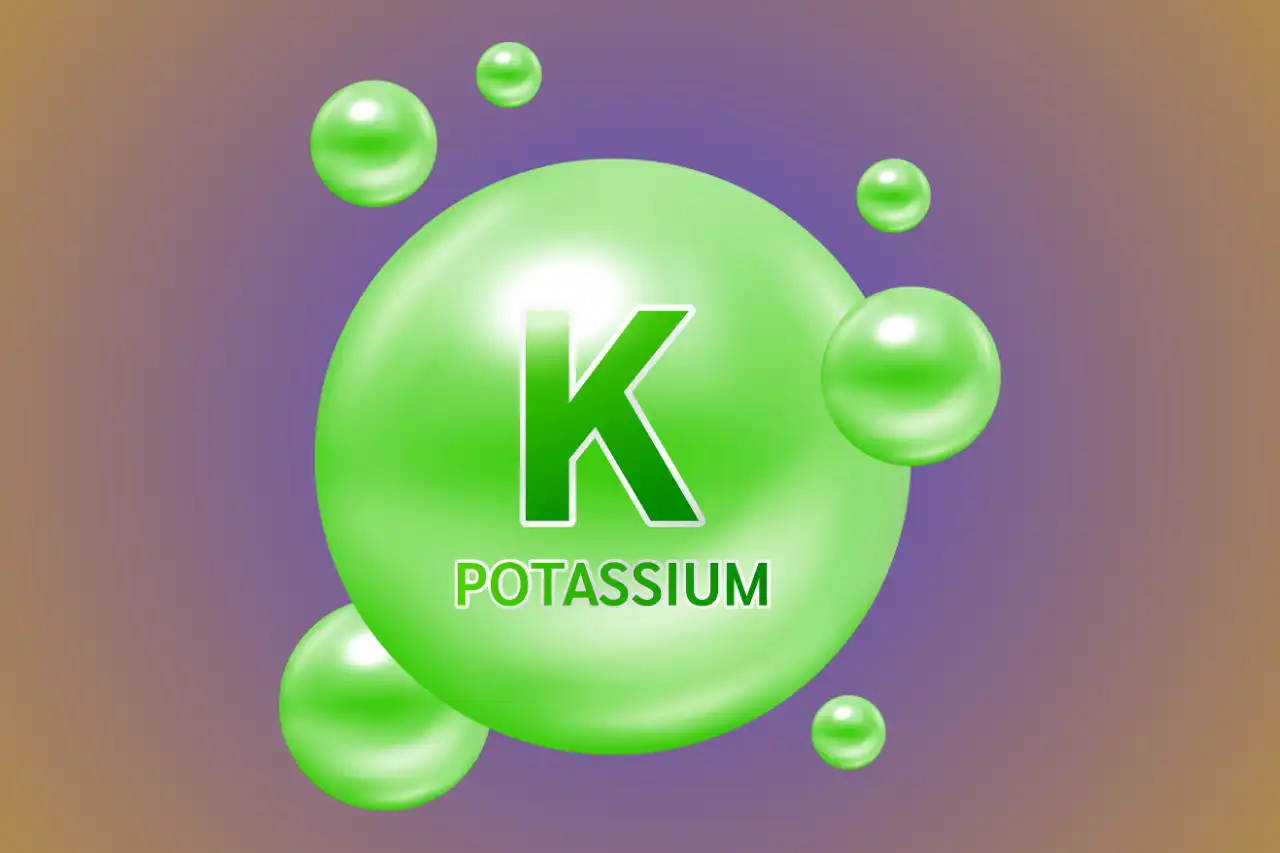-: POTASSIUM :-
POTASSIUM:- THE LIFE-GIVING ELECTROLYTE FOR STRENGTH, STAMINA, AND STABILITY…!!!
Potassium is an essential mineral and electrolyte that plays a crucial role in maintaining fluid balance, muscle contractions, nerve signaling, and heart function. It helps regulate blood pressure, supports metabolism, and keeps cells functioning optimally. Despite its importance, many people do not get enough potassium from their diet, which can lead to serious health issues.
Daily Requirements
Men
- Teens (9-18 years) – (2,300-3,000 mg) per day.
- Men 18+ years – 3,400 mg per day.
Women
- Women – 2,600 mg per day.
- Pregnant / Breastfeeding women – 2,900 mg per day.
Children
- Infant (0-6 months) :- (400-700 mg) per day.
- Children (1-8 years) :- (2,000-2,300 mg) per day.
Function on different Organ
- Muscles and Nerves
Details
Potassium ensures smooth muscle contractions and efficient nerve signaling. It prevents muscle cramps, supports reflex actions, and helps in voluntary and involuntary muscle movements.
- Brain and Nervous System
Details
It supports nerve communication and cognitive function. Potassium helps in transmitting electrical signals in the brain, improving memory, concentration, and overall mental function.
- Heart and Blood Vessels
Details
Potassium counteracts sodium’s effects, helping maintain healthy blood pressure and preventing hypertension. It also ensures a steady heart rhythm.
- Kidneys and Fluid Balance
Details
Helps maintain electrolyte and fluid balance.Potassium regulates water levels in the body and supports kidney function by preventing excessive calcium loss.
- Digestive System
Details
Supports proper digestion and nutrient absorption. Potassium helps regulate stomach acid production and ensures smooth bowel movements.
- Metabolism and Energy Production
Details
Potassium aids in breaking down carbohydrates into energy and maintains proper muscle endurance.
Symptoms incase of Deficiency
- Hypokalemia
- Mild Deficiency Symptoms:-
- Muscle cramps and weakness.
- Fatigue and low energy.
- Irregular heartbeat.
- Constipation.
- Severe Deficiency Symptoms:-
- High blood pressure.
- Numbness and tingling.
- Heart palpitations and arrhythmia.
- Mental confusion and mood swings.
Diagnosis
To check potassium levels in the body, doctors may recommend:-
- Serum Potassium Test
Details
Serum Potassium Test measures potassium levels in the blood.
- Urine Potassium Test
Details
Urine Potassium Test determines how much potassium is being excreted.
Food Sources
Veg Sources
- Fruits
- Bananas.
- Oranges.
- Avocados.
- Watermelon.
- Cantaloupe.
- Blackberries.
- Grapefruits.
- Pomegranate.
- Guava.
- Vegetables
- Spinach.
- Sweet potatoes.
- Tomatoes.
- Broccoli.
- Carrot.
- Legumes
- Beans.
- Lentils.
- Chickpeas.
- Kidney beans.
- Nuts and Seeds
- Almonds.
- Pistachios.
- Flax seeds.
- Apricots.
- Whole Grains
- Quinoa.
- Brown rice.
Non-Veg Sources
- Fish
- Salmon.
- Cod.
- Tuna.
- Meats
- Chicken.
- Beef.
- Turkey.
- Dairy Products
- Milk.
- Cheese.
- Yogurt.
What if Overconsumption
Excess potassium intake (Hyperkalemia) can lead to:-
- Irregular Heartbeat: Severe cases may cause heart arrhythmia.
- Muscle Weakness: Can lead to paralysis.
- Kidney Stress: Excess potassium can be harmful for people with kidney disease.
- Nausea and Stomach Issues: May cause vomiting and diarrhea.
The upper limit for potassium is not defined, as excess intake from food is rare. However, supplements should only be taken under medical supervision.
Potassium is a heart-healthy, muscle-supporting, and brain-boosting mineral that keeps the body functioning at its best. A well-balanced diet rich in natural potassium sources can help prevent deficiencies and promote overall well-being. However, both too little and too much potassium can be dangerous, so maintaining the right balance is essential.












